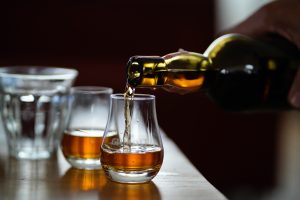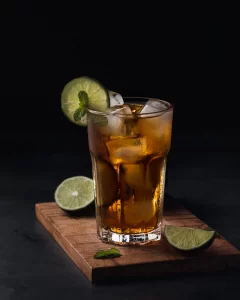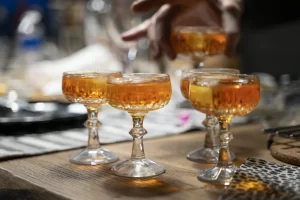Kentucky Distillers Association
Due primarily to the impact of prohibition, the craft distilling scenes in most states are quite young… if they exist at all. Kentucky, on the other hand, has had a thriving scene for some time now, as evidenced by the fact that the local distillers’ guild, the Kentucky Distillers Association, has been active since 1880!
This historic organization has been cultivating a culture of support within the distillery community ever since, helping to nurture the scene and establish The Bluegrass State as a bourbon-producing powerhouse on the national and world stage.
Today, we’re going to shine a light on the Kentucky Distillers Association and show off just how much they do for their member distilleries. But first, let’s take a look at some of the legislation surrounding distilleries in Kentucky.
Kentucky Distillery Legislation
Alongside Tennessee, Kentucky was the first state to produce whiskey, so the laws surrounding this time-honored tipple are as mature as the drink they refer to.
State Fees
Excise fees per gallon aren’t too steep in the great state of Kentucky — We’re talking $7.86 per gallon.
This places Kentucky as the 16th most expensive state to produce spirits in where tax is concerned, which doesn’t sound great, but it’s actually excellent.
Kentucky’s tax rates are far closer to the cheaper end of the spectrum than they are to those at the pricey end.
Licensing Requirements
There are two different distiller’s licenses in Kentucky, the Class A, and the Class B.
The Class A license is for distillers who plan to produce more than 50,000 gallons a year on the property referenced in the application, while the Class B license is for distillers who plan to produce fewer than 50,000 gallons per year.
For the Class A license, an annual fee of $3090 must be paid, and for the Class B license, an annual fee of $1000.
Restrictions
Both Class A and Class B licenses stipulate that the holder must produce at least 600 gallons of spirit per year, unless, that is, the facility is a designated educational space that serves only to instruct on the distillation process rather than enter the commercial market.
What’s more, any spirit produced by a commercial distillery must be transported in a vehicle operated by the licensee themselves and said vehicle must have a sign of form affixed to its sides, indicating – among other things – the name and license number of the driver.
But it’s not just licensing stipulations that determine how distilleries can operate.
The three-tiered system of Kentucky used to be an oppressive structure that meant distillers couldn’t sell their own products privately, but, thankfully, the HB500 bill has eased some of the rules. It also permitted the opening of one “satellite” off-site tasting room/store with full retail rights.
Who Are The Kentucky Distillers Association?
The Kentucky Distillers Guild was originally formed by 32 pre-prohibition era distillers unified by their goal to protect Kentucky’s most famous drink and the skilled craftspeople who made it from overly obstructive legislation.
This core ethos still remains a crucial aspect of the organization, but, as you’d expect, their mission statement has broadened somewhat over the years as the mantle passed from generation to generation.

As it stands, the Kentucky Distillers Association team consists of:
- Eric Gregory — President: In the modern era, there has been no greater advocate for Kentucky’s signature drink and the people that produce it than Eric Gregory. He has played a pivotal role in getting the industry to where it is today.
- Colleen Thomas — Vice President of Operations: A key operator in the educational side of the Kentucky distillation scene, Colleen Thomas has been instrumental in the opening of numerous distilleries across the state.
- Adam Johnson — Vice President of State Relations: Adam is the storyteller of the KDA, tasked with enchanting people and organizations beyond state lines with Kentucky bourbon-based tales, encouraging them to pay a visit and check out the scene for themselves.
- Amandalin Ryan — Director of Kentucky Bourbon Trail Experiences: Amanadalin isn’t only a master mixologist, but a master organizer and director of the Kentucky distillery scene’s most essential event, the Kentucky Bourbon Trail.
- Sara Barnes — Director of Industry Responsibility & Sustainability: Sara Barnes is all about generating diversity within the Kentucky scene and ensuring production processes are in harmony with nature.
- Jack Mazurak — Director of Governmental & Regulatory Affairs: Despite hailing from upstate New York, Jack leads the charge on all governmental and legislative affairs. He’s the one winning favor with the higher-ups and lobbying for beneficial change to local laws.
- Annie King — Director of Member Services: One of the KDA’s priorities is to help member distilleries grow, and Annie King is the person that distillers reach out to to get the ball rolling on this front.
- Allison Delande — Director of Special Projects: Allison is an event planning whiz with over 20 years of experience in the industry. Whenever a special project is in the works, she’s at the helm of operations.
- Marielle McElmurray — Operations Manager & Executive Assistant: Marielle is responsible for making, not just the KDA as amazing as it can be, but the Kentucky distilling industry as a whole.
There’s also a sizable board of directors:
- Ingrid Gentry — Director
- Kevin Smith — Immediate Past chair
- Chris Morris — Chair
- Marco Barassi — Director
- Will Arvin — Director
- Antione Smith — Director
- Ryan Ashley — Treasurer
- Jessica Pendergrass — Secretary
- Gigi Dadan — Director
- Erika Lapish — Director
- Andrea Wilson — Director
- Kaveh Zamanian — Director
- Britt Kulsveen — Director
- Ken Lewis — Proof Level Representative
- Mark Coffman — Proof Level Representative
- Tyler Harris — Proof Level Representative
- Kevin Hall — Educational Representative
- Peter Pogue — Chair of Craft Membership
Where Is The Kentucky Distillers Association Headquartered?
The KDA is headquartered in the historic Gooch House located at 104 E 2nd, Frankfort, Kentucky 40601.
What Does The Kentucky Distillers Association Do?
The KDA has two primary missions, to promote and protect Kentucky distillers and distilleries, and they do so by uniting and leading the industry within the state.
They grant exposure to member distilleries by featuring them on their site and giving them spots on the expertly curated distillery trails of Kentucky, all while lobbying for beneficial legislation surrounding taxation and restrictions such as the three-tier distribution system.
They also provide educational resources and general support in order to help new distilleries get up and running and into the green, something that can be incredibly difficult when attempted without help.
The result of these efforts is a huge influx in revenue and bolstered economic growth, thus demonstrating the industry’s worth and giving them more bargaining power with local legislatures to improve conditions for Kentucky distilleries.
Final Thoughts
The story of Kentucky bourbon is the story of Kentucky, and although prohibition sentiment tarnished the history of The Bluegrass State, the KDA have reclaimed the narrative, and restored the pride of the bourbon capital of the world!









